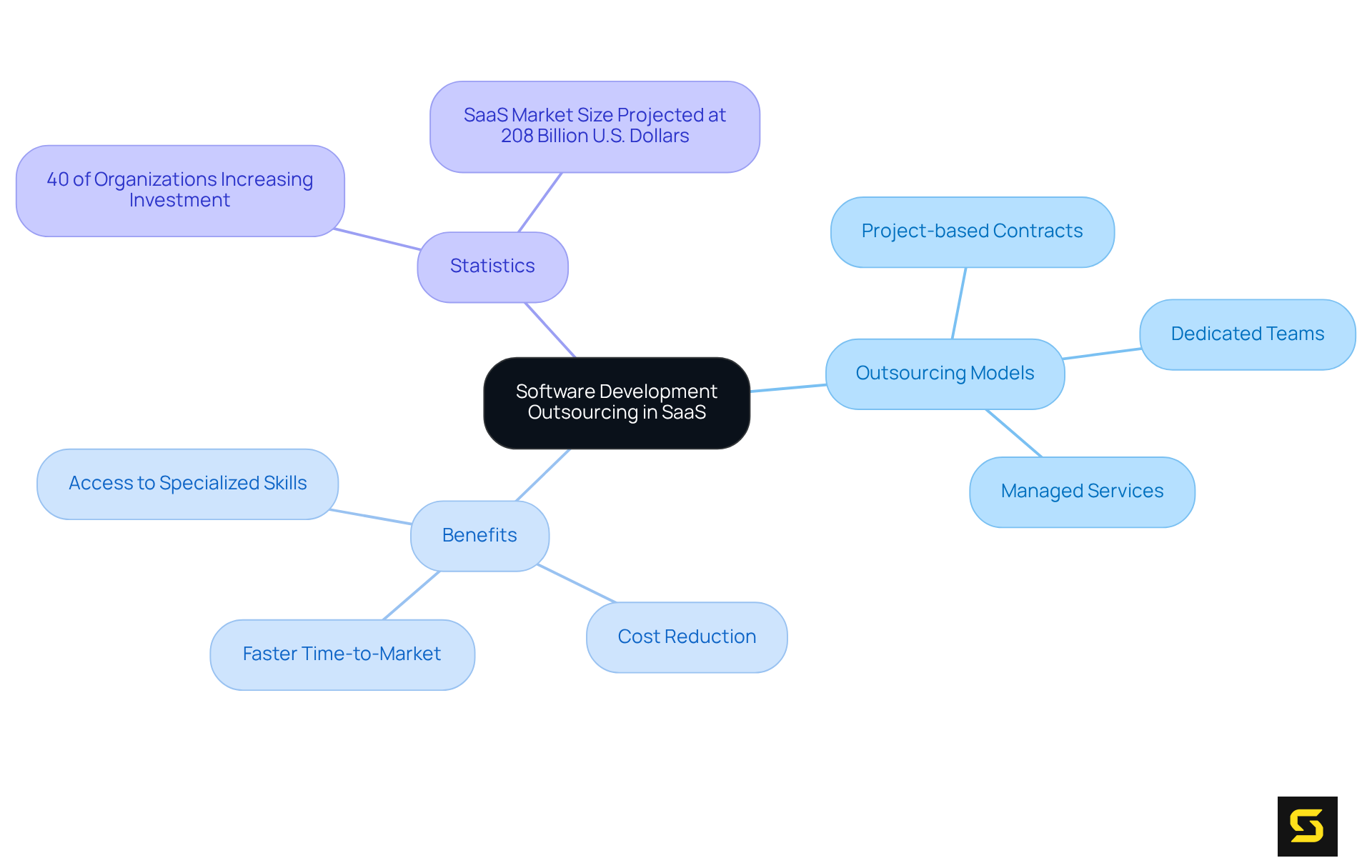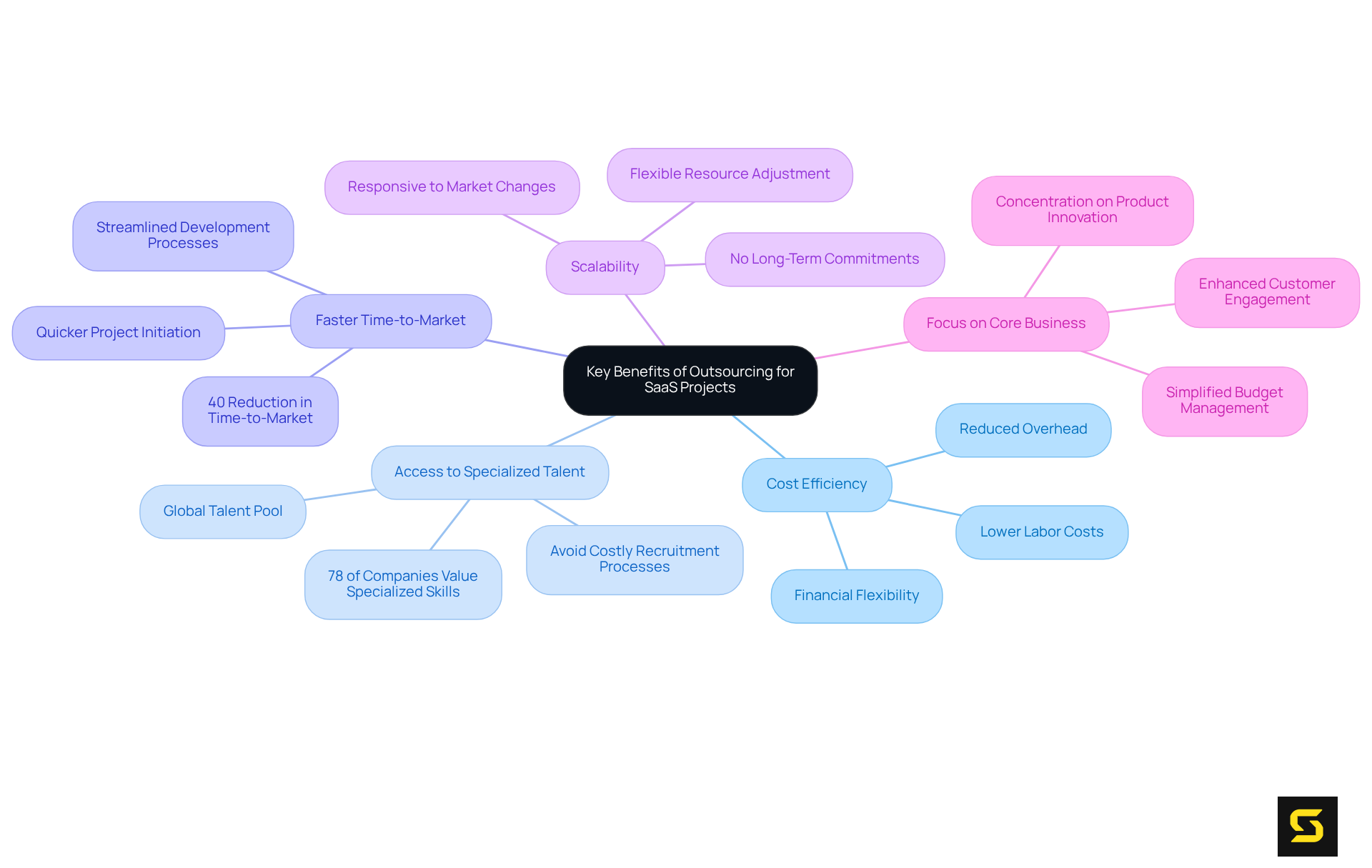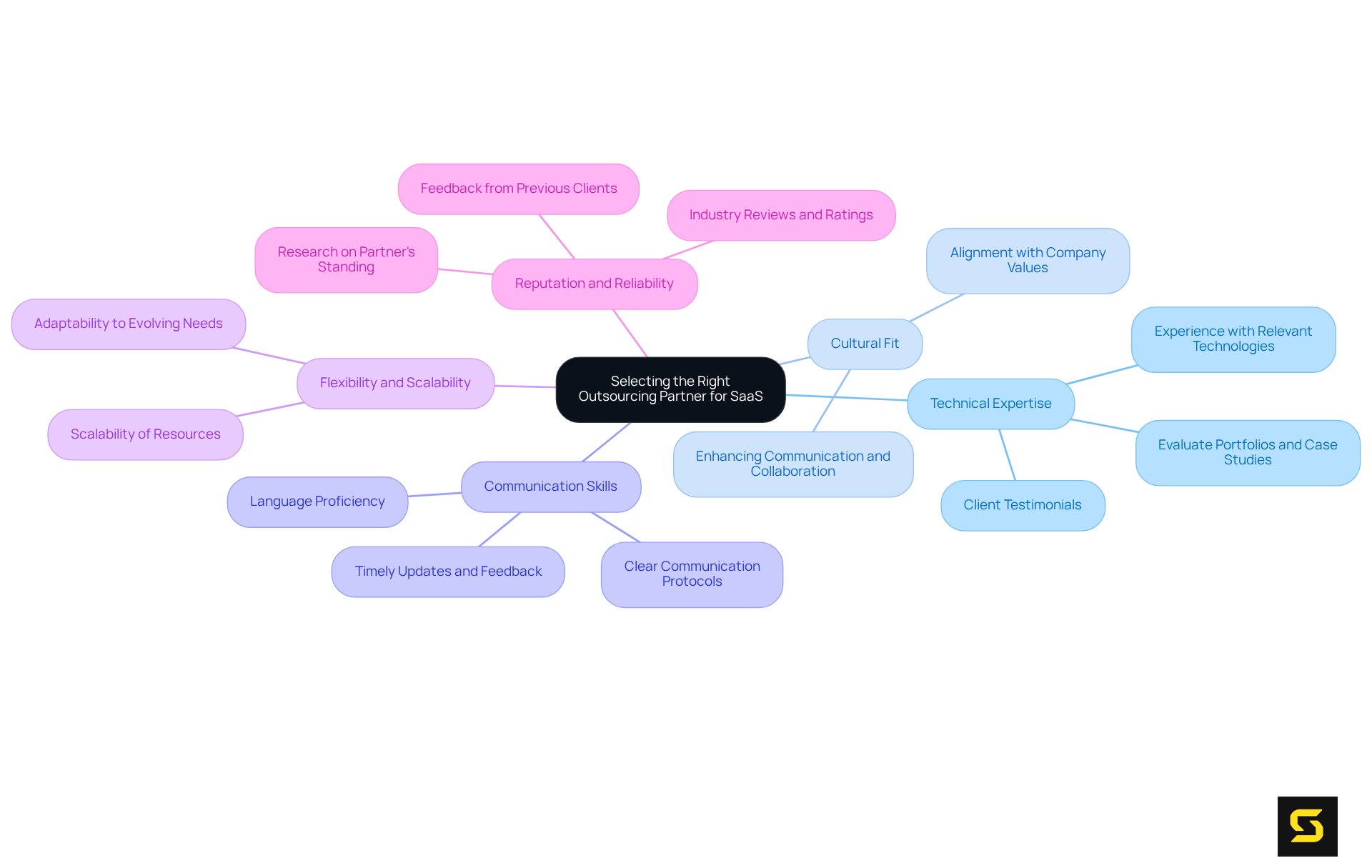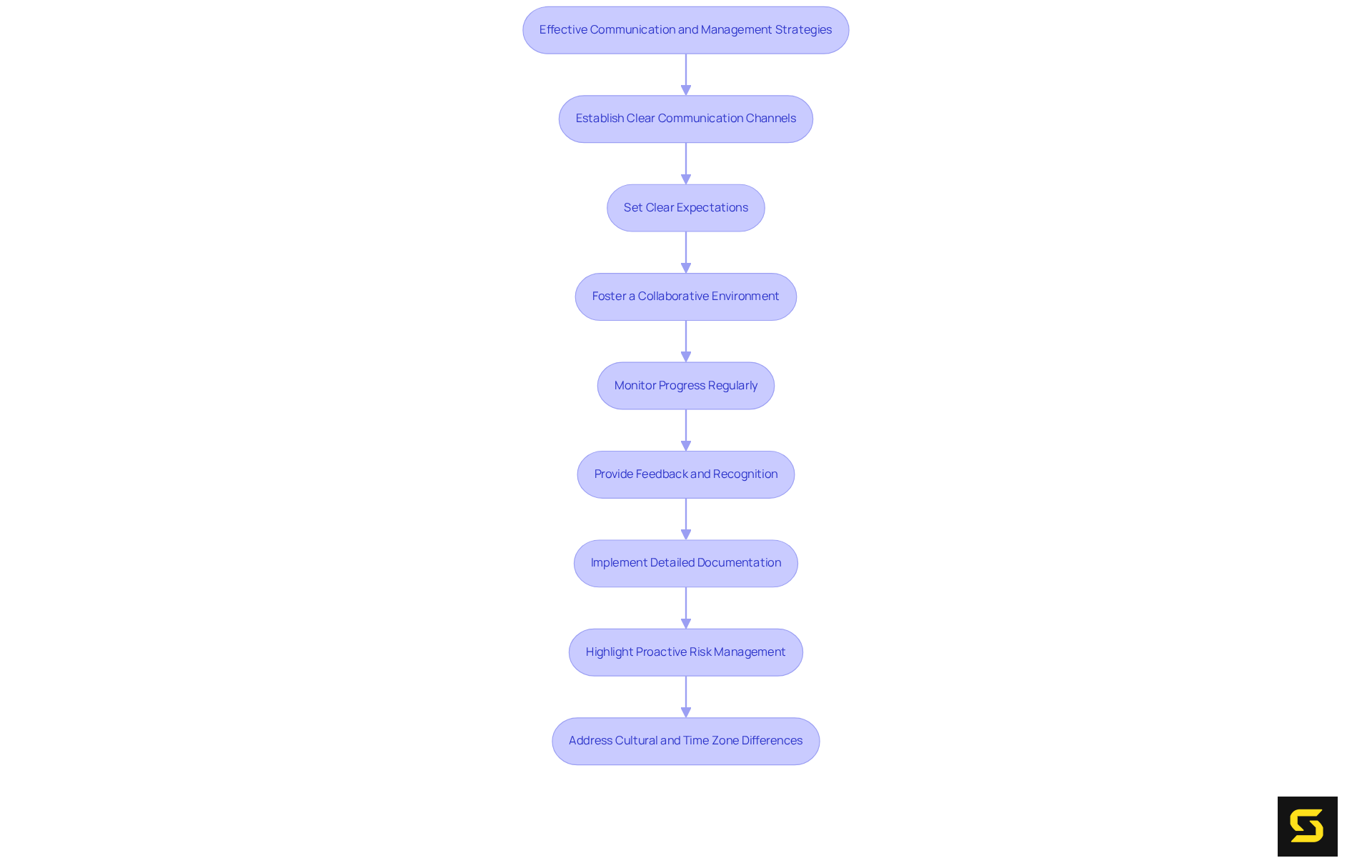Overview
Outsourced software development services for SaaS can significantly enhance success by offering companies cost efficiency, access to specialized talent, and a quicker time-to-market. These services empower organizations to concentrate on their core competencies while effectively leveraging external expertise. This strategic approach not only leads to improved product quality but also strengthens competitiveness in an ever-evolving market landscape. By adopting outsourced development, companies position themselves to thrive amidst rapid changes and heightened demands.
Introduction
Outsourcing software development has emerged as a pivotal strategy for companies navigating the competitive landscape of Software as a Service (SaaS). By leveraging external expertise, organizations can streamline their operations, reduce costs, and accelerate product launches, all while focusing on their core business objectives.
However, as the demand for outsourced services continues to grow, so too do the challenges associated with finding the right partners and managing effective communication.
How can SaaS companies maximize the benefits of outsourcing while mitigating potential pitfalls? This question not only highlights the complexities involved but also underscores the necessity for a strategic approach to outsourcing that prioritizes both efficiency and collaboration.
Understand Software Development Outsourcing in SaaS
Outsourced software development services in the cloud services sector enable companies to collaborate with external partners for the design, development, and maintenance of software applications. This strategic approach enables organizations to leverage outsourced software development services along with specialized skills and resources that may not be readily available in-house. Various external service models exist, including:
- Project-based contracts
- Dedicated teams
- Managed services
Each offering distinct advantages tailored to diverse business needs. By capitalizing on these models, software-as-a-service companies can focus on their core competencies while reaping the benefits of expertise from seasoned developers well-versed in the latest technologies and methodologies.
Statistics reveal that 40% of organizations plan to increase their investment in outsourced software development services, highlighting its growing importance in the industry. Furthermore, the growth of the software-as-a-service market to an estimated 208 billion U.S. dollars by 2023 underscores the importance of outsourced software development services in this expansion. Outsourcing, particularly through outsourced software development services, can substantially reduce costs, as companies often achieve savings through access to comprehensive services at significantly lower hourly rates. Successful software companies demonstrate that using outsourced software development services not only accelerates time-to-market but also enhances product quality, allowing them to remain competitive in a rapidly evolving landscape. For example, a SaaS company that partnered with Designli successfully launched new features more quickly and reduced development costs, illustrating the tangible benefits of this approach.
As industry leaders assert, outsourced software development services afford the flexibility to scale development efforts efficiently, enabling businesses to adapt to shifting demands without the burden of maintaining a large in-house team. However, it is essential to acknowledge potential pitfalls, such as communication gaps, suitability concerns, and diminished direct control. This strategic partnership model is vital for fostering innovation and achieving sustainable growth in the software-as-a-service market.

Leverage Key Benefits of Outsourcing for SaaS Projects
Outsourcing software development for SaaS projects offers several significant advantages:
-
Cost Efficiency: Outsourcing enables companies to substantially lower labor costs and overhead associated with maintaining an in-house team. This is particularly advantageous for startups and small businesses operating within tight budget constraints, allowing for more effective resource allocation. Research from Deloitte indicates that using outsourced software development services can reduce time-to-market by up to 40%, providing a crucial competitive advantage when introducing new features.
-
By utilizing outsourced software development services, companies gain access to a global talent pool with specialized skills across various technologies. This approach facilitates the identification of appropriate skills for specific tasks without the prolonged and often costly recruitment process. Recent surveys reveal that 78% of companies cite access to specialized talent as a significant benefit of contracting services.
-
Faster Time-to-Market: External development groups can typically initiate projects more swiftly than internal teams, enabling companies to launch their products more quickly. This acceleration can provide a critical competitive edge in rapidly evolving markets, where timing is essential. Using outsourced software development services can streamline development processes, reducing the time from conception to deployment.
-
Scalability is enhanced by outsourced software development services, which provide the flexibility to adjust development resources based on requirements. Companies can easily modify their team size, ensuring responsiveness to changing market conditions and project needs without the burden of long-term commitments. This adaptability is vital for software-as-a-service firms that rely on outsourced software development services to address fluctuating demands.
-
Focus on Core Business: By utilizing outsourced software development services for non-core functions, SaaS companies can concentrate on their primary business objectives, such as product innovation and customer engagement. This strategic focus enhances overall performance and drives growth, allowing organizations to thrive in a competitive landscape. Meghan Neville emphasizes that delegating tasks helps companies remain financially agile by simplifying budget management and reducing unexpected expenses.
While outsourcing tasks provides numerous advantages, establishing clear communication channels and documentation practices is crucial to mitigate potential pitfalls, such as quality concerns and misconceptions. By addressing these aspects, software-as-a-service product owners can maximize the benefits of external support and ensure successful outcomes.

Select the Right Outsourcing Partner for Your SaaS Needs
Selecting the right outsourcing partner for your SaaS project is crucial and involves several key considerations:
-
Technical Expertise: Begin by evaluating potential partners through their portfolios, case studies, and client testimonials. Prioritize those with demonstrated experience in the specific technologies and frameworks relevant to your initiative. Access to specialized knowledge is a key motivator for 92% of business leaders when choosing outsourced software development services, making this a critical factor in your decision.
-
Cultural Fit: It is essential to ensure that the partner's work culture aligns with your company's values and practices. A strong cultural fit enhances communication and collaboration, which are vital for achieving success and fostering long-term partnerships.
-
Communication Skills: Effective communication cannot be overstated in the context of successful outsourcing. Assess the partner's language proficiency and their ability to articulate ideas clearly. Establishing clear communication protocols is vital to maintain alignment and ensure timely updates, thereby preventing misunderstandings that could disrupt initiatives.
-
Flexibility and Scalability: Opt for a partner that can adapt to your evolving needs and scale their resources accordingly. This flexibility is essential for navigating fluctuations and addressing future scalability requirements, particularly in the fast-paced SaaS environment, which can benefit from outsourced software development services.
-
Reputation and Reliability: Conduct thorough research on the partner's standing in the industry. Look for reviews, ratings, and feedback from previous clients to gauge their reliability and performance. Reviewing references and online evaluations can provide valuable insights into their past work, significantly improving your project's chances of success.

Implement Effective Communication and Management Strategies
To ensure successful collaboration with outsourced teams, it is crucial to implement effective communication and management strategies that foster alignment and drive success.
-
Establish Clear Communication Channels: Define the primary communication tools and protocols to be utilized throughout the initiative, such as Slack or Microsoft Teams. Regular updates and check-ins are essential for maintaining alignment and transparency among all team members.
-
Set Clear Expectations: Clearly outline objectives, timelines, and deliverables from the outset. This clarity is vital in avoiding misunderstandings and ensuring that all parties are aligned on goals, significantly improving success rates.
-
Outsourced software development services can play a crucial role in enhancing operational efficiency. Foster a Collaborative Environment: Encourage open dialogue and collaboration between in-house and outsourced teams. Utilizing collaborative tools enables real-time communication and document sharing, fostering a culture of teamwork that is essential for success.
-
Monitor Progress Regularly: Schedule consistent progress meetings to review milestones and address any challenges. This proactive approach enables early detection of issues, ensuring that the initiative remains on course and aligned with business goals.
-
Provide Feedback and Recognition: Offer constructive feedback to external groups and acknowledge their contributions. Positive reinforcement not only encourages motivation but also boosts team morale, resulting in better outcomes and a stronger partnership.
-
Implement Detailed Documentation: Create comprehensive documentation on coding standards and quality assurance practices to establish clear quality expectations and standards for the initiative.
-
Highlight Proactive Risk Management: Engage in proactive risk management by discussing potential challenges early in the project and establishing contingency plans to address them.
-
Address Cultural and Time Zone Differences: Acknowledge the challenges posed by cultural and time zone differences, and implement strategies such as overlapping working hours and cultural awareness training to enhance collaboration.

Conclusion
Outsourced software development services have become essential for SaaS companies aiming to enhance their capabilities and remain competitive in a rapidly evolving market. By leveraging external expertise, organizations can concentrate on their core business functions while gaining access to specialized skills and resources that may not be available in-house. This strategic shift not only fosters innovation but also facilitates sustainable growth, making it a compelling choice for businesses determined to thrive in the software-as-a-service landscape.
The article identifies several key advantages of outsourcing, including:
- Cost efficiency
- Access to a global talent pool
- Faster time-to-market
- Enhanced scalability
These benefits empower SaaS companies to allocate resources more effectively and respond swiftly to changing market demands. Furthermore, selecting the right outsourcing partner is crucial; factors such as technical expertise, cultural fit, and communication skills significantly influence successful collaboration. Implementing effective management strategies further solidifies this partnership, creating an environment conducive to achieving shared goals.
In conclusion, the importance of outsourced software development services in the SaaS sector is undeniable. As the industry continues to expand, embracing outsourcing as a strategic tool can lead to improved operational efficiency and innovation. Companies are urged to explore these opportunities, prioritize effective communication, and choose partners wisely to maximize the potential of their outsourcing endeavors. By doing so, they can not only enhance their service offerings but also position themselves for long-term success in an increasingly competitive digital landscape.
Frequently Asked Questions
What is software development outsourcing in SaaS?
Software development outsourcing in SaaS involves collaborating with external partners for the design, development, and maintenance of software applications, allowing companies to access specialized skills and resources not available in-house.
What are the different outsourcing service models available?
The different outsourcing service models include project-based contracts, dedicated teams, and managed services, each offering distinct advantages tailored to various business needs.
Why are companies increasingly investing in outsourced software development services?
Statistics show that 40% of organizations plan to increase their investment in outsourced software development services, indicating its growing importance in the industry, particularly as the SaaS market is projected to reach 208 billion U.S. dollars by 2023.
What are the benefits of outsourcing software development?
Outsourcing can substantially reduce costs, accelerate time-to-market, and enhance product quality, allowing companies to remain competitive by leveraging expertise from seasoned developers.
Can you provide an example of the benefits of outsourcing in SaaS?
An example is a SaaS company that partnered with Designli, which successfully launched new features more quickly and reduced development costs, demonstrating the tangible benefits of outsourcing.
How does outsourcing provide flexibility for businesses?
Outsourced software development services afford the flexibility to scale development efforts efficiently, enabling businesses to adapt to changing demands without the need to maintain a large in-house team.
What are some potential challenges of outsourcing software development?
Potential challenges include communication gaps, suitability concerns, and diminished direct control over the development process.
Why is outsourcing considered vital for the SaaS market?
Outsourcing is vital for fostering innovation and achieving sustainable growth in the software-as-a-service market, as it allows companies to focus on their core competencies while benefiting from external expertise.





